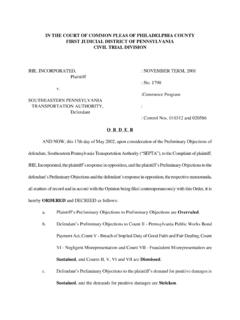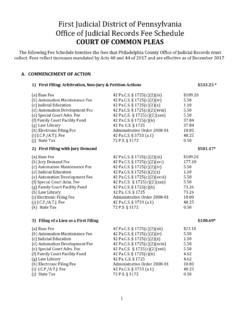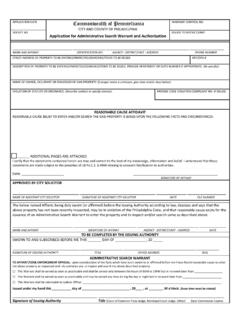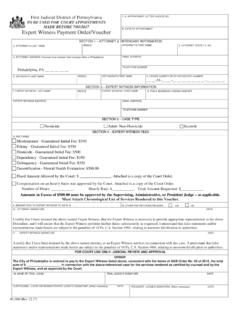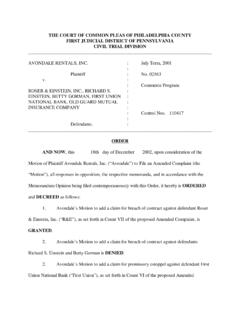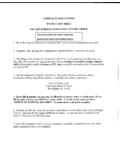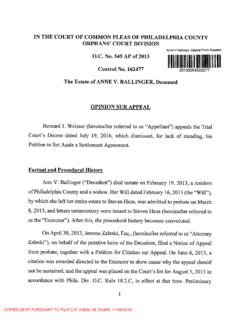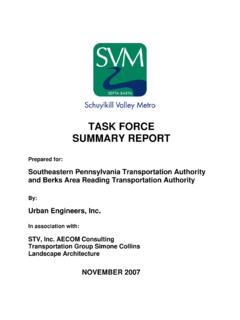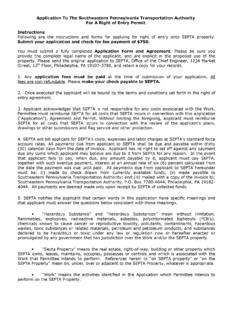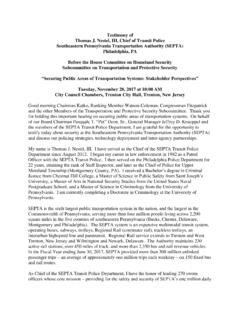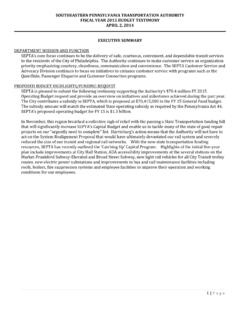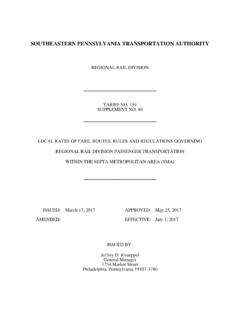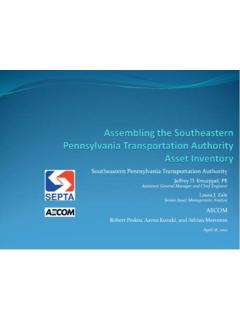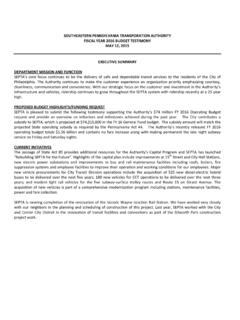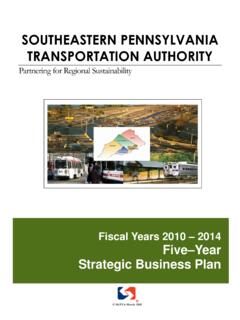Transcription of IN THE COURT OF COMMON PLEAS OF PHILADELPHIA …
1 IN THE COURT OF COMMON PLEAS OF PHILADELPHIA COUNTY FIRST JUDICIAL DISTRICT OF pennsylvania CIVIL TRIAL DIVISION WEW, Ltd. and Henry and Jacqueline Willis, Plaintiffs / Movants )))))December Term, 2004 v. ) No. 2036 southeastern pennsylvania transportation authority , Defendant / Respondent ))))) COMMERCE PROGRAM Motion Control ORDER AND NOW, this 12th day of September, 2006, upon consideration of the motion for the appointment of a board of viewers by Plaintiffs WEW, Ltd. and Henry and Jacqueline Willis, the preliminary objections thereto filed by Plaintiff southeastern pennsylvania transportation authority , the respective memoranda of law in support and opposition, and all other matters of record, it is ORDERED that: 1.
2 Defendant s preliminary objection is SUSTAINED and Plaintiffs motion for the appointment of a board of viewers is DISMISSED. BY THE COURT , MARK I. BERNSTEIN, J. IN THE COURT OF COMMON PLEAS OF PHILADELPHIA COUNTY FIRST JUDICIAL DISTRICT OF pennsylvania CIVIL TRIAL DIVISION WEW, Ltd. and Henry and Jacqueline Willis, Plaintiffs / Movants )))))December Term, 2004 v. ) No. 2036 southeastern pennsylvania transportation authority , Defendant /Respondent ))))) COMMERCE PROGRAM Motion Control OPINION Plaintiffs, WEW Ltd. ( WEW ) and Henry and Jacqueline Willis, (the Willises ) initiated de facto condemnation proceedings by filing a motion for the appointment of a board of viewers.
3 Defendant, southeastern pennsylvania transportation authority ( SEPTA ), filed preliminary objections to that motion. For the reasons discussed below, SEPTA s preliminary objection is sustained and the motion for the appointment of a board of viewers is dismissed. BACKGROUND In 1999, SEPTA began to renovate a section of its Market Frankford Elevated Train Line between 46th and 63rd Streets. From the onset, SEPTA understood that its activities would impact over two hundred businesses along the In 2002, the work reached the 61st block of Market Street where Plaintiffs own real property. To this date, 1 See Septa s Executive Summary at 2, Exhibit A to Plaintiffs motion for the appointment of a board of viewers. work continues along this block despite projections that SEPTA would clear the area at some point in 2005.
4 WEW Ltd. purchased several properties along the 61st block of Market Street, in 1998-99, after SEPTA announced its plans to renovate that section of the Market Frankford Line. Although WEW planned to develop these properties into commercial and residential facilities, the premises remain to this day undeveloped and vacant. Mr. Edward West, the sole shareholder, officer and employee of WEW, indicates that this corporation paid $240,000 for the He further asserts that SEPTA s delays in the renovation have prevented him from obtaining the financing needed to develop his plans. In essence, he contends that no bank will have faith in his ability to find tenants while SEPTA s crews, machinery, fencing, and debris, continue to restrict access to his He also submits SEPTA s work plans to show that the pertinent section of Market Street was completely blocked, 24 hours per day, seven days per week, between January 20, 2003 and March 27, Mr.
5 West also asserts that WEW earns no income, that this company has been posting losses since 2000, and that he has been personally paying all the expenses required to keep the properties solvent, insured, and in Mr. and Mrs. Willis, owners of a property also on the 61st block of Market Street, have been operating a paper goods business on their premises since 1972. In addition to this business, the Willises keep a Contract Postal Unit and a public notary service in the same facility. Mr. Willis indicates that one-hundred percent of his business relies on 2 Exhibit L to Plaintiffs motion for the appointment of a board of viewers at 5:14. 3 Motion for the appointment of a board of viewers, 70. 4 Exhibit K to Plaintiffs motion for the appointment of a board of viewers.
6 5 Motion for the appointment of a board of viewers, 84. customer In addition Mr. Willis states that his business has been unable to receive deliveries, for at least six months beginning in November 2005, as a result of the interference caused by SEPTA s ongoing Furthermore, Mr. Willis asserts in his motion that SEPTA s activities caused a power surge which resulted in an interruption of the electrical service, and in damage to his electronic He also avers that the uncertainty surrounding the end of SEPTA s renovation work has forced him to set aside plans to install an ATM machine on the premises, as well as to open a cyber caf and He adds that SEPTA s interference has caused his $10,000 investment in the Contract Postal Service to yield less than $1,000 in gross revenues since July 2005, even though he expected to generate gross revenues of up to $150,000 per year on that DISCUSSION I.
7 WEW s Claim is Based on Doubtful, Speculative and Conjectural Premises At the onset, the COURT notes that when a plaintiff petitions for the appointment of a board of viewers, the trial COURT must first rule on the preliminary question of whether the de facto taking has If the COURT finds that there has been a de facto taking, then it sends the case to a board of Preliminary objections are the proper response to a petition for the appointment of viewers pursuant to .. 26 504 of the Eminent Domain If the preliminary objections raise factual issues whose 6 Exhibit V to Plaintiffs motion for the appointment of a board of viewers at 6:19. 7 Id. at 8:28. 8 Motion for the appointment of a board of viewers, 102. 9 Id. at 126. 10 Id. at 123-25.
8 11 Millcreek Township v. Cross Company, 152 Pa. Commw. 576, 620 558, 561 (1993) rearg. denied. 12 Id. 13 Id. resolution will determine whether a de facto taking has occurred, then the COURT must hold an evidentiary hearing. 14 If the preliminary objections do not raise such factual issues, then the COURT must simply review the petition and either sustain the preliminary objections if the petition fails to aver sufficiently that a de facto taking occurred, or overrule the preliminary objection if the petition avers sufficiently that there was a de facto WEW asserts that the construction delays, the trash accumulations, the obstructive fencing, and the street closures, prevented it from obtaining the financing necessary to develop the properties, and that such interference constituted a de facto taking.
9 This COURT disagrees. A claim of de facto taking, when based on an alleged future or prospective injury, finds no relief in the law of eminent domain. In re: Petition of 1301 Filbert Limited Partnership, 64 Pa. Comm. 605, 441, 1345, 1360 (1980). In Filbert, a partnership purchased a vacant and dilapidated hotel with the intention of renovating it before the Bicentennial celebrations of 1976, even though the City of PHILADELPHIA had announced plans to build a tunnel adjacent to the property. Id. at 1347-1348. Although the City informed the partnership that it would appraise the hotel to ascertain its fair value in light of a possible condemnation, the local Commissioner informed the partnership that the City would neither purchase the hotel, nor condemn it. Id. at 1349. The partnership, while expending some of its funds to begin renovation, could not secure the financing necessary to complete the project.
10 Id. at 1350. In refusing to lend money to the partnership, the banks expressed their concern that the ongoing 14 Id. 15 Id. at 561-62. public work would so disrupt the hotel s operation as to preclude its future success. Id. Thus the partnership, unable to acquire financing for the plan, alleged a de facto taking and petitioned for the appointment of a board of viewers. The trial COURT determined that no de facto taking had occurred. The partnership appealed. On appeal, the pennsylvania Commonwealth COURT affirmed the trial COURT s finding. In agreeing that a de facto taking had not occurred, the Commonwealth COURT analyzed the nature of the impact that the public project exerted on the privately owned property. Id. at 1347. The COURT concluded that the claim, being linked to an alleged injury that [was] not only prospective but.
